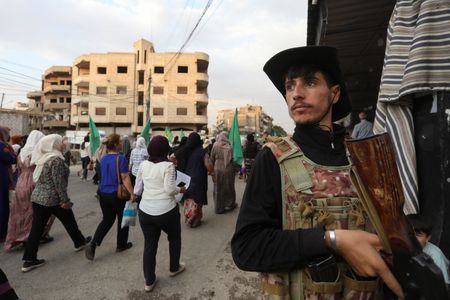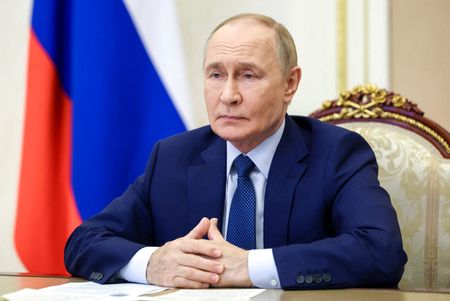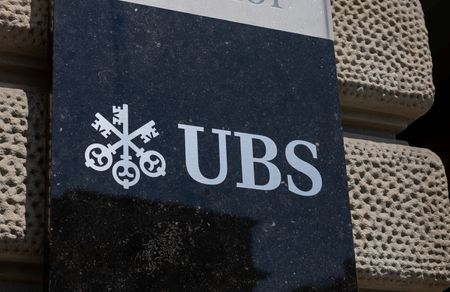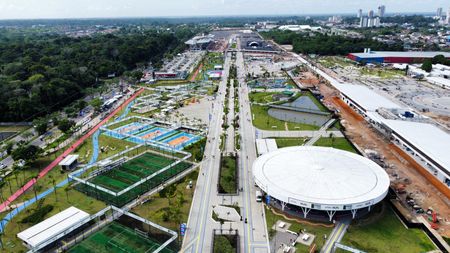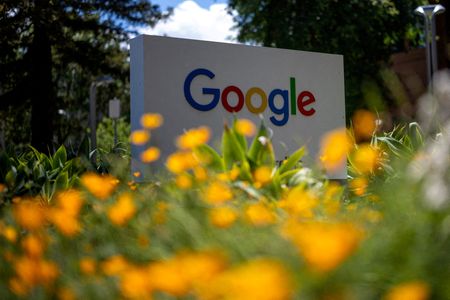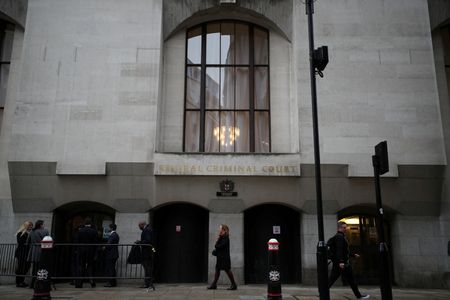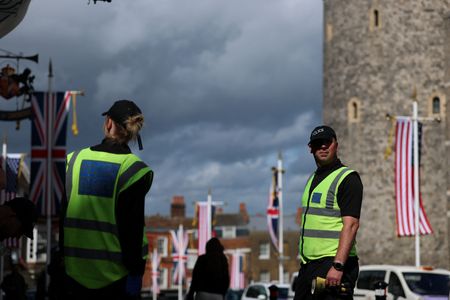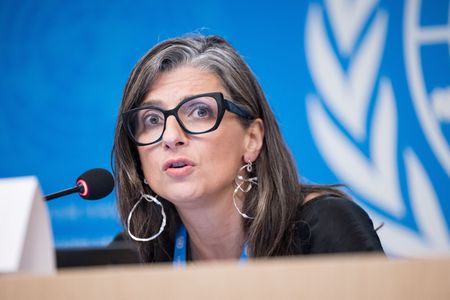(Refiles to fix formatting of bullet points)
By Samia Nakhoul and Timour Azhari
QARDAHA/JARAMANA, Syria (Reuters) – Syrian President Ahmed al-Sharaa has won major diplomatic victories since seizing power nine months ago, but he risks losing the battle that matters most: to hold his deeply divided country together.
In Syria’s northeast, Kurdish forces are resisting integration into the state after 14 years of civil war, and are demanding a new constitution to recognize their rights. In the southeast, members of the Druze community are openly calling for independence after violent clashes with government forces.
And, in Syria’s northwest, a leader of the Alawite community says Sharaa’s administration threatens its survival after Sunni militants affiliated to the government massacred hundreds of civilians there in March.
Reuters travelled through the heartlands of Syria’s Alawite, Christian and Druze minorities last month and spoke to dozens of residents and community leaders who voiced anger at Sharaa’s Islamist administration following outbreaks of sectarian violence since he ousted President Bashar al-Assad.
“How can we trust a state that turns its tanks against its own people?” asked Abu Bilal, a 45-year-old Druze father of three, referring to clashes between government forces and Druze militia in the southern region of Sweida in July. “They’re pushing us toward partition.”
Druze spiritual leader Sheikh Hikmat al-Hajari late last month called publicly for independence, accusing government-backed Bedouin forces of trying to “eliminate” the Druze. He thanked Israel for intervening, after it attacked army convoys in Sweida in July and struck the defence ministry building in Damascus.
In parts of Sweida, Druze fighters now man checkpoints, patrol roads, and run local councils. A series of protests there last month saw people calling for independence and waving Israeli flags alongside the multi-coloured Druze banner.
Syrian officials have accused Israel – which seized swathes of territory across southern Syria after Assad’s ouster – of fanning sectarian divisions in an effort to destabilize Syria.
The Israeli prime minister’s office did not respond to Reuters questions for this story. Israel has said it’s committed to protecting the Druze and keeping its border regions free from militants.
Sharaa’s government has rejected calls for federalism or partitioning of the country, and said it wants to unite the country and rule for all Syrians. “If federalism or decentralisation means partition, then they are unacceptable,” he told Arabic newspaper editors last month.
Syria’s Information Ministry, Foreign Ministry and Presidency did not respond to requests for comment.
A senior Syrian official, who asked not to be identified, said reconciliation in Sweida must begin with allowing displaced Bedouins and Druze to return to their homes and an exchange of prisoners between Sunni Arab and Druze militants as a means to gradually rebuild trust: “The rifts are extremely deep. This will take years to fix.”
Sharaa has pledged to punish those responsible for the atrocities in Sweida and, in early September, Syrian authorities said they had detained members of the interior and defence ministries linked to the killings.
But one person involved in efforts to mediate between the Druze and Sharaa’s administration said very little progress had been made since July’s clashes and a loose “alliance of minorities” was emerging in Syria with the backing of Israel.
Last month, 400 representatives of minority groups including Kurds, Alawites and Druze gathering to discuss a decentralized Syrian state at a meeting convened by Kurdish leaders in the northeastern city of Hassakeh. A statement from the talks called for a new constitution guaranteeing minorities’ rights.
Ghazal Ghazal, a spiritual leader of Syria’s 2 million Alawites, told the meeting Sharaa’s government was imposing extremist ideology in the name of religion. “This threatens the survival of minorities,” he said.
Sharaa – a former al Qaeda leader who once had a $10 million bounty on his head – scored a major diplomatic victory in May when he won recognition from U.S. President Donald Trump at a meeting in Riyadh. The U.S. subsequently lifted most sanctions on Syria and the Trump administration has voiced its support for Sharaa’s efforts to unify and stabilize the country.
Later this month, Sharaa is expected to address the U.N. General Assembly in New York – the first time a Syrian leader has done so in nearly 60 years and a milestone on his journey from warlord to statesman.
But Andrew Tabler, a senior fellow at the Washington Institute think-tank who focuses on Syria and the Levant, said Sharaa risked squandering that political capital if he could not reconcile Syria’s alienated minority groups.
“There’s a real risk Sharaa won’t be able to put the pieces of the country back together,” Tabler said. “It’s either reconciliation or he governs only part of Syria. That doesn’t mean he’ll be ousted — just that his authority will be limited to a part of the country.”
TURKEY PRESSING FOR KURDISH SOLUTION
In northeast Syria, the risk of a return to conflict looms if a Kurdish-led enclave there refuses to integrate into the central state under a deal brokered in March by Washington, according to two government sources and three foreign diplomats.
Implementation of March’s deal – which would hand the central government control over valuable oil, gas, and electricity assets in the northeast – has stalled, with Kurdish authorities saying an interim constitution approved by Sharaa does not adequately protect minority rights.
The senior Syrian official told Reuters that regional powerbroker Turkey – which has emerged as a strong backer of Sharaa’s government – was growing impatient and would support military action against the Kurds. Ankara strongly opposes Kurdish autonomy and regards the enclave in northern Syria as a threat to its own security.
Damascus has asked Ankara to delay any military offensive to allow negotiations to unfold, the official said. Turkey has agreed to provide training and munitions to Syria’s military, being rebuilt by Sharaa.
“The deadline is essentially until the end of the year,” said the official. He said that Damascus believed U.S. President Donald Trump had given Turkey a free hand to resolve the Kurdish security issue.
Turkey’s Defence Ministry declined to comment on the possibility of any military action. The White House did not immediately respond to a request for comment.
A U.S. Department of State official said the United States wanted to see a stable, peaceful and prosperous Syria, which required unity, but it was up to the Syrian people to choose the type of government they want.
Sharaa has publicly said that progress is being made towards a deal, but it will take time.
The Kurdish-led Syrian Democratic forces – which Turkey accuses of links to a domestic militant group, the PKK – enjoyed U.S. backing during Syria’s civil war, is well equipped and has tens of thousands of fighters under its command. Turkish President Tayyip Erdogan has publicly warned Kurdish forces to lay down their arms or “be buried with them.”
Abdelwahab Khalil, a member of the SDF’s council, told Reuters its leadership supports integration with Syria’s central government “based on genuine partnership and constitutional recognition” of all Syrian components; military integration alone was not sufficient.
Tabler of the Washington Institute said Sharaa needed to make compromises with minorities, particularly the Kurds, for reconciliation to succeed.
“If he wants to control all of Syria, he must make real political concessions,” Tabler said.
ALAWITES “CONDEMNED TO DEATH”
Syria’s Sunni heartlands suffered disproportionately during the civil war, with cities like Homs and Aleppo reduced to rubble. After five decades of corrupt rule by the Assad family, many Syrians are pleased power has returned to Sunni Arabs, who constitute two-thirds of Syria’s 24 million people. Their main concern is whether the new administration can revive Syria’s economy, still reeling from sanctions and the civil war.
Assad portrayed his secular Baath Party as a protector of minorities, which were largely spared the destruction wreaked on Sunni areas during the war. While Sharaa pledges to govern for all Syrians, the massacre of hundreds of Alawites in coastal regions in March sparked fears of a backlash against minorities.
In Qardaha, an Alawite village in the mountains overlooking Syria’s northwest coast, residents remember with bitterness March’s massacres. Many now talk openly of partition or international protection.
“We want a proper state: a rule of law – not a gang ruling us,” said Abu Hassan, in his 50s.
The government promised to punish those responsible. Its investigation into the killings, released in July, concluded that Syrian commanders did not order attacks on civilians – a finding dismissed by Alawite community leaders.
Some residents recounted cases of kidnappings of Alawite girls by armed men. Amnesty International has called on the government to investigate the abduction of Alawite women and bring the perpetrators to justice. Syria’s government has said that it found no cases of kidnapped Alawite girls or women in the coastal areas.
Some young men in Qardaha and the nearby village of Jableh said they skip university classes to avoid checkpoints manned by government and government-aligned forces where harassment, abduction, and sectarian abuse are rampant.
“Young men and women don’t dare leave the village. Arrests and killings are rampant,” said Hassan Laham, who runs a grocery in the village. “The Alawite community is being condemned to death.”
The village is the ancestral home of Assad’s family. Several residents voiced grievances against the ousted leader, who fled into exile in Russia, for abandoning them to bear the cost of their association with him.
Assad’s departure also leaves a void in the domestic leadership of the Alawite community. Several Alawite associations overseas are lobbying foreign governments to protect the minority in Syria and to press for a decentralized or federal system of government.
MINORITY GROUPS COORDINATING
Morhaf Ibrahim, a Florida-based doctor who left Syria in 2005 and founded the Alawites Association of the United States in January, said he is petitioning Congress and the U.S. State Department, while seeking to build bridges with other Western governments, including potentially Israel.
“Alawites paid a heavy price under Assad, forced to fight to defend his regime. Now they are paying the price again with killings and sexual violence and other violations,” said Ibrahim.
The association also has close cooperation with the Kurds, with Hajari’s associates in Sweida and with Chrisitan groups and moderate Sunnis, Ibrahim said.
Christian communities have been spared the worst of the sectarian violence. In Wadi al-Nasara – the lush “Valley of the Christians” in western Syria – government patrols pass through but rarely interfere with daily life. The valley, considered a safe haven, maintains its Christian traditions, celebrating its Virgin Mary in mid-August with concerts.
But more than 20 residents told Reuters of their fear for the future under the new Syrian state and said that, without greater autonomy, they would have no choice but to emigrate.
“We’re protected here, but we can’t move freely,” said Michel, 27, who works at a shawarma restaurant, and is supporting his sick parents. “I wish I could leave Syria, but I can’t afford it. The fear never leaves us.”
In Dweileh, a Christian neighborhood in Damascus, a suicide bombing by an Islamist group at a church killed 25 people in June and deepened the fear gripping residents.
“This is a mixed area – Christian, Alawite, Sunni – but no-one feels safe anymore,” said shopkeeper Saeed Bassolo, a Christian.
(Reporting by Samia Nakhoul and Timour Azhari; Additional reporting by Maya Gebeily; Writing by Samia Nakhoul; Editing by Daniel Flynn)

